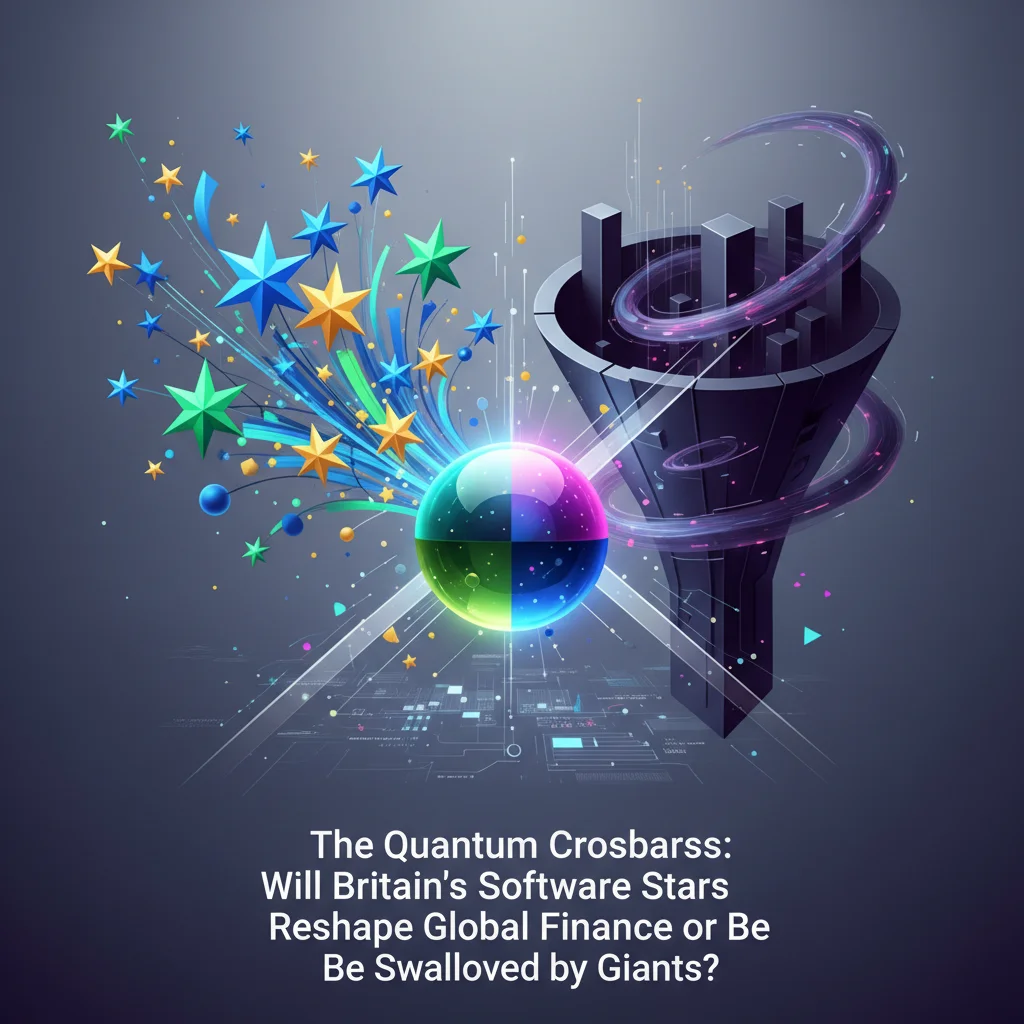
The Quantum Crossroads: Will Britain’s Software Stars Reshape Global Finance or Be Swallowed by Giants?
The Dawn of a New Computing Era
Imagine a computer so powerful it could design new life-saving drugs in days, create materials for hyper-efficient batteries, and crack the most complex financial models that stump today’s supercomputers. This isn’t science fiction; it’s the promise of quantum computing. And while global tech behemoths like Google and IBM are racing to build the hardware, a quieter but equally crucial revolution is brewing in the United Kingdom—a revolution in quantum software.
In the quiet halls of British universities, a new generation of start-ups has emerged, armed with groundbreaking algorithms and a vision to become the “Microsofts” of the quantum age. Companies like Phasecraft and Riverlane are not just academic spin-offs; they are potential titans in an industry projected to reshape everything from medicine to the global economy. However, they stand at a critical crossroads: Can they scale to become independent giants, or will they be acquired by the very US tech giants whose hardware they aim to empower? For investors, business leaders, and anyone interested in the future of financial technology, the answer to this question holds profound implications.
Beyond Zeroes and Ones: Why Quantum Software is the Real Game-Changer
To understand the opportunity, we must first grasp the fundamental shift quantum computing represents. Classical computers, from your smartphone to the most powerful data centers, think in “bits”—a stream of 0s and 1s. Quantum computers use “qubits,” which can exist as 0, 1, or both simultaneously (a state known as superposition). This, combined with another quantum phenomenon called entanglement, allows them to explore a vast number of possibilities at once, making them exponentially more powerful for specific types of problems.
But this incredible hardware is just a powerful engine without a driver. That’s where quantum software comes in. It’s the set of instructions, the operating system, and the applications that translate real-world problems into a language a quantum computer can understand and solve. This software layer is arguably where the most immediate value and intellectual property will be created. It’s less about building the car and more about designing the GPS, the engine control unit, and the self-driving AI that make it useful. This is the lucrative space where Britain is carving out a world-leading niche.
Amazon's Layoff Tremors: A Necessary Correction or a Warning Sign for the Global Economy?
Meet the British Vanguard: Phasecraft and Riverlane
Two companies, in particular, exemplify the UK’s prowess in this deep-tech frontier. Both born from world-class academic research, they are tackling different but equally vital parts of the quantum software stack.
Phasecraft: Designing the Future, One Molecule at a Time
Spun out of University College London and the University of Bristol, Phasecraft is focused on one of the most promising near-term applications of quantum computers: materials and drug discovery. Their goal is to develop software that can simulate molecular interactions with perfect accuracy—a task that is impossibly complex for classical computers. The potential impact on the global economy is staggering. Imagine designing a new catalyst that makes green hydrogen production cheap and efficient, or a new battery material that doubles the range of electric vehicles. “We want to be the first to achieve quantum advantage,” says co-founder Ashley Montanaro, referring to the moment a quantum computer definitively solves a useful problem that no classical computer can source. The implications for ESG investing and industrial innovation are immense.
Riverlane: Building the “Windows” for Quantum Computers
While Phasecraft builds the “apps,” Cambridge-based Riverlane is building the operating system. Their flagship product, Deltaflow, is designed to be a universal layer that sits between the quantum hardware and the applications. It manages the complex and error-prone qubits, making it vastly simpler for developers to write useful quantum algorithms. As Riverlane’s founder Steve Brierley puts it, their mission is to make quantum computers useful sooner (source). In the world of fintech and high-performance computing, the value of a dominant operating system is well understood. By creating the foundational software layer, Riverlane aims to become an indispensable part of the entire quantum ecosystem, regardless of who builds the best hardware.
To better understand their distinct roles in the emerging quantum ecosystem, consider this comparison:
| Feature | Phasecraft | Riverlane |
|---|---|---|
| Core Focus | Quantum Algorithms & Applications | Quantum Operating System (OS) |
| Analogy | The “App Store” (e.g., Photoshop, Excel) | The “Operating System” (e.g., Windows, macOS) |
| Primary Goal | Achieve ‘Quantum Advantage’ for specific problems like materials discovery. | Create a universal OS (Deltaflow) to control all types of quantum hardware. |
| Impact on Finance | Indirect: Discovering new materials for green finance; potential for complex modeling. | Direct: Providing the stable platform needed for developing quantum trading and risk algorithms. |
| University Roots | UCL & University of Bristol | University of Cambridge |
The High-Stakes Gamble: Quantum’s Impact on Finance and Investing
The race for quantum supremacy is not just an academic pursuit; it’s a high-stakes financial game with the potential to rewrite the rules of global finance. The UK government has recognized this, committing £2.5bn to its national quantum strategy, but this pales in comparison to the vast sums being invested by US tech giants and the Chinese state.
For the financial sector, quantum computing is a double-edged sword. Its potential applications are transformative:
- Trading and Portfolio Optimization: Quantum computers could analyze a near-infinite number of variables to optimize trading strategies and manage risk on the stock market in ways that are currently unimaginable. This could render many current quantitative models obsolete.
- Cryptography and Blockchain: A sufficiently powerful quantum computer could break the encryption that underpins the entire modern banking system and technologies like blockchain. This creates a massive cybersecurity threat, but also an opportunity for companies developing “quantum-resistant” encryption.
- Financial Modeling: Complex derivatives pricing and economic simulations, which currently require hours or days on supercomputers, could be run in minutes, providing a huge advantage in a speed-driven market.
This immense potential is precisely why US tech giants are watching companies like Phasecraft and Riverlane so closely. Acquiring a leading quantum software firm would be a strategic masterstroke, giving them a ready-made team of world-class experts and a portfolio of priceless intellectual property. For investors like Hermann Hauser, a key figure in the UK tech scene, the fear is a repeat of the past, where UK innovations like ARM (sold to SoftBank) and DeepMind (sold to Google) ended up in foreign hands. The challenge is to foster an investing environment that provides the long-term, patient capital needed to see these ventures through to maturity.
HSBC's Profit Plunge: A Strategic Overhaul or a Sign of Deeper Troubles?
The Path to Independence: Can Britain’s Giants Stand Alone?
For Phasecraft and Riverlane, the path to becoming standalone giants is fraught with challenges. The primary hurdle is capital. Deep-tech investing is not for the faint of heart; it requires a long-term vision and the stomach for a decade or more of development before seeing significant revenue, let alone profit. While both companies have successfully raised early-stage funding, they will need access to much larger pools of growth-stage capital to compete globally.
The second challenge is talent. The UK has a world-class talent pool thanks to its universities, but it’s competing against the astronomical salaries and resources offered by Silicon Valley. Retaining top quantum physicists and engineers is a constant battle. A premature acquisition could trigger a “brain drain” that hollows out the UK’s nascent ecosystem.
However, there is a clear path forward. A combination of government support, a robust domestic venture capital scene, and strategic partnerships can create the conditions for success. By focusing on specific, high-value problems, these software companies can potentially generate revenue far sooner than the hardware players, creating a virtuous cycle of investment and growth. Their independence is crucial for the health of the entire UK tech economy, fostering competition and ensuring that the economic benefits of this profound technological shift are realized domestically.
The Milei Tsunami: How Argentina's Election Unleashed a Global Market Shockwave
The Investor’s Takeaway: Navigating the Quantum Future
So, what does this mean for the average investor or finance professional? While you likely can’t invest directly in Phasecraft or Riverlane today, the quantum revolution will have cascading effects across the stock market. The key is to think about second-order impacts:
- Watch the Incumbents: Keep an eye on which large corporations—in pharmaceuticals, energy, and banking—are partnering with or investing in these quantum start-ups. Their early adoption could give them a significant competitive advantage.
- Cybersecurity Re-evaluation: The advent of quantum computing will necessitate a complete overhaul of digital security. Companies specializing in quantum-resistant cryptography will become critically important investments.
- The ‘Picks and Shovels’ Play: Just as in the gold rush, investing in the toolmakers can be a winning strategy. This includes not only quantum software firms (when they go public) but also companies that produce the specialized components, materials, and cooling technologies required for quantum hardware.
Ultimately, the story of Britain’s quantum software start-ups is a microcosm of the global technology landscape. It’s a tale of brilliant innovation, fierce competition, and strategic financial maneuvering. Whether Phasecraft and Riverlane become the next global tech titans or cautionary tales of potential sold too soon will depend on their bravery, the vision of their investors, and the strength of the ecosystem supporting them. Their journey will be a defining feature of the UK’s technological and economic future for decades to come.


